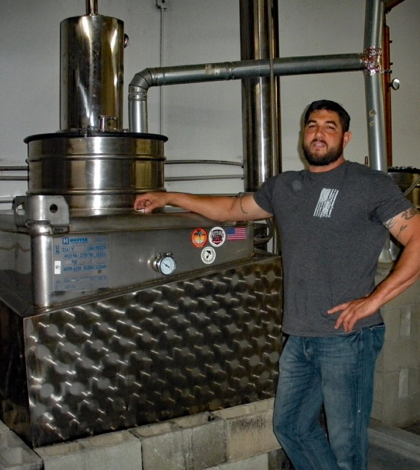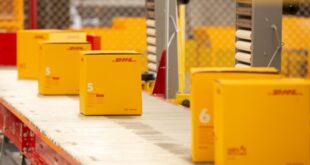Riley Distillery, producer of bourbon and whiskey, started in 2014 and is just now making inroads into the local market. Some changes by the state might make that task easier, according to the business’ co-owners.
Like any entrepreneur, Jason Riley would like to see the business he started grow into a massive operation, his products sold all over the country.
For now, he will settle for watching his business – one of two whiskey distilleries operating in the Inland Empire – attract a following and fill a niche.
“I hope it goes well,” said Riley, founder and co-owner of J. Riley Distillery in Redlands and a self-described lover of whiskey and bourbon. “I don’t know how big it will get. I just want to see it grow and see it fill a need I know is out there.”
Riley, a Redlands native, and his business partner, Doug Kidd, met five years ago while they were both serving in Afghanistan. They started the distillery, which produces whiskey and bourbon in an industrial complex at 721 Nevada St., in late 2014.
The distillery produces three products: California Clear, a basic whiskey and the company’s staple product; Jeremiah Riley Bourbon [a tribute to his oldest son] and 1775, a light whiskey.
During its first seven months in business, J. Riley Distillery didn’t sell a single bottle of either product. When it finally did sell a bottle, to KB Korner Liquor in Redlands last July, the two business partners held a party.
“I never got discouraged,” said Kidd, who like Riley had no prior experience in distilling. “I knew it was a tough business, and I knew that any new business is going to struggle, so I just kept working.”
Business has improved since then. The distillery is selling about 400 bottles a month to restaurants, bars and liquor stores in the Inland Empire, mostly in and around Redlands, and it’s capable of producing twice that many bottles, Kidd said.
Getting any new business off the ground is difficult, but a distillery presents some unique obstacles. Cities often resist giving them permits, distributors are hard to find, there is a myriad of local and states regulations to follow and the product faces a lot of competition.
Prohibited by law from distributing their product themselves, Riley and Kidd persuaded Cash and Carry, a wholesale liquor distributor based in San Bernardino, to carry it. At the time, they had a handshake agreement with a distributor, but the distributor was making little progress.
Cash and Carry specializes in providing product to bars and liquor stores that run short of something. After awhile, the company was able to get J. Riley’s bottles into various locations around the Inland Empire.
“People were asking for it,” Riley said. “We had to do something. I really wanted it sold in my hometown.”
Riley first approached Kidd about starting a distillery when they were both overseas. Before being deployed, Riley spent 10 years running his own contracting business, restoring restaurants and grocery stores.
“I knew I didn’t want to go back to that,” he said.
Kidd, a San Diego native, said he was interested in Riley’s proposal right away.
“I knew he was a smart guy and that he had run a successful contracting business,” Kidd said. “I saw his business plan and it made sense. I knew it could work.”
Riley spent a year teaching himself how to make whiskey and bourbon. He then converted his contracting business into a distillery, doing all of the construction and mechanical work himself and paying for the improvements out of his own pocket.
“It was difficult,” Riley said of learning how to distill. “It’s a lot like making beer, which is a very complicated process.”
To work in the distillery businesses is to deal constantly with restrictions. Tours of the facility are allowed, but are limited to 30 people per gathering. Tastings are also permitted, but until recently California distilleries were allowed only six tastings of a quarter ounce each per person.
Distributing is the life’s blood of the distilling business, but if you own the distillery you’re prohibited from doing so. Only a licensed distributor is allowed to do that, and it can be difficult to get them to try to sell a new product.
“We can’t take our bottles to a retailer and sell them directly,” Kidd said. “Seven states have that law, including California. Finding a distributor was probably the hardest part about getting this started.”
State distilleries caught a break last October, when Gov. Jerry Brown signed the Craft Distillers Act of 2015. That allows distilleries to serve a limited number of mixed drinks on site, like a bar, and serve up to 2.25 liters of alcohol per day, per person.
It also allows them to sell bottles, something they weren’t allowed to do before.
All the distillery has to do is get a craft distillers license from the state, along with local approval, which J. Riley was able to do both. Its local permit, issued by the Redlands Planning Commission, was the first of it kind ever given out by the city.
So when Marko and Sarah Suput of Redlands walked into the distillery Wednesday evening and sampled some 92 proof Jeremiah Riley Bourbon, they became the first people to imbibe mixed drinks at J. Riley.
The couple, who learned about the serving on Facebook, gave their stamp of approval and said they would recommend J. Riley to friends. Sarah even said the scent reminded her of her grandfather, who was a bourbon drinker.
Riley and Kidd both said they plan to continue serving mixed drinks, calling it a good way to promote the business. If someone wants to buy a bottle, so much the better, but they aren’t turning their distillery into bar.
Like a winery, they want to serve a sample or two and then let people be on their way.
Riley still has yet to establish itself, but it’s off to a good start, Riley said.
“People like the product,” Riley said. “I’ve put six years of my life getting this thing started, and I can tell you that that’s very rewarding.”
 IE Business Daily Business news for the Inland Empire.
IE Business Daily Business news for the Inland Empire.


